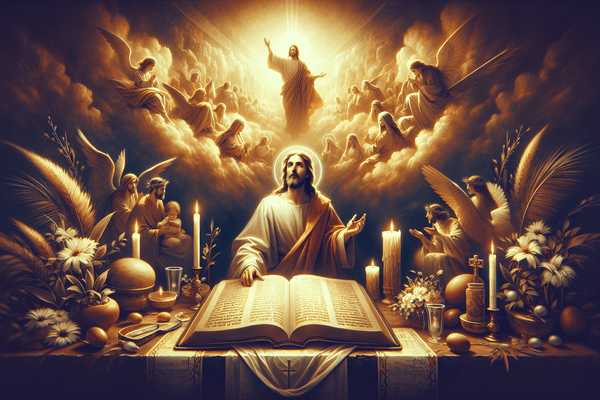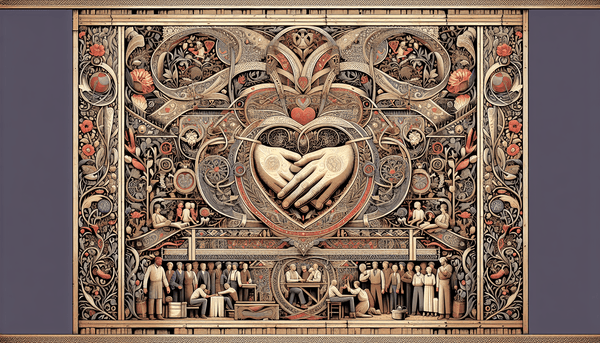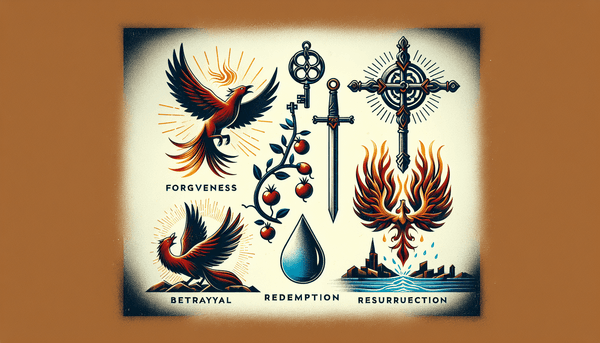Palm Sunday: The Triumphal Entry
On Palm Sunday, Christians commemorate the momentous entry of Jesus into Jerusalem, an event laden with prophetic significance and symbolic gestures. As Jesus rode in on a humble donkey, fulfilling the prophecy of Zechariah (Zechariah 9:9), He was met with a throng of people waving palm branches, an act of homage and recognition of victory. This scene, vividly captured in Matthew 21:1-11, juxtaposes the humility of Christ with the regal acclamation 'Hosanna!'—a plea for salvation turned into a declaration of Jesus' messianic kingship. The use of palm branches, as noted in John 12:13, signifies triumph and victory, foreshadowing the ultimate victory of Jesus over death. Palm Sunday invites Christians to reflect on the dual nature of Jesus' kingship and humility, a theme that carries through to the vision in Revelation 7:9-10, wherein a multitude from every nation stands before the Lamb with palm branches in hand.
Good Friday: The Crucifixion of Jesus
Good Friday stands as a solemn beacon within Holy Week, inviting Christians to meditate on the gravity of Jesus' crucifixion. On this day, the faithful gather to mourn the sacrifice Jesus made on the cross, an act of love that brought forgiveness for the sins of humanity. Many church traditions involve reading the Gospel accounts of Jesus' suffering and death, such as John 19:16-30, which narrates the crucifixion's harrowing details. Reflecting on the fulfillment of Isaiah's prophecy of the suffering servant (Isaiah 53:5), believers are called to contemplate the depths of God's love. The Stations of the Cross, a devotional practice, guides Christians through Jesus' final moments, including His poignant plea for forgiveness in Luke 23:34 and the centurion's declaration of Jesus' divine sonship in Mark 15:37-39. Good Friday is a day to bear witness to the transformative power of Jesus' sacrifice, as described in 1 Peter 2:24, and to prepare our hearts for the joy of resurrection.
The Significance of March 24 in the Church
While March 24 does not hold a specific biblical reference, it may represent a day of remembrance or celebration within various Christian traditions. The liturgical calendar is dotted with feast days and memorials that honor the life of Jesus, the apostles, and saints. On days like March 24, some denominations may recall the lives of specific saints or historical events that have shaped the faith community. As we explore biblical narratives, from the Pharisees to the Magi, and reflect upon their significance, Hebrews 13:7-8 urges us to remember our leaders and their teachings. Christians may find March 24 an opportunity for reflection or to initiate conversations on the Word. The day serves as a reminder that, while not every date is scripturally significant, each can be an occasion to reflect on our faith journey, as Paul encouraged in 1 Corinthians 11:1-2, to follow Christ's example and uphold the traditions handed down to us.
Conclusion
The events of Holy Week are more than historical footnotes; they are foundational to Christian faith and identity. From the triumphal yet humble entry on Palm Sunday to the somber reflection of Good Friday, these days invite believers to journey through the full spectrum of Jesus' final days on earth. By exploring the interconnectedness of Palm Sunday, Good Friday, and Passover, we gain a deeper appreciation for the narrative arc of redemption in Christian theology. As we conclude, let us carry forward the lessons of humility, sacrifice, and deliverance into our daily lives, allowing them to shape our understanding and practice of the faith.
FAQ
Q: What do we do on Good Friday?
A: On Good Friday, Christians participate in various traditions such as attending church services, reading the accounts of Jesus' crucifixion, meditating on the Stations of the Cross, and observing moments of silence and prayer to reflect on the sacrifice Jesus made for humanity.
Q: Is Passover before or after Christ's death?
A: Passover is the Jewish festival that commemorates the Israelites' deliverance from slavery in Egypt and it occurs before Christ's death. In the Christian tradition, Jesus' Last Supper with His disciples was a Passover meal, and His crucifixion takes place during the Passover period.
Q: Why is March 24 important in the church?
A: While March 24 does not hold specific biblical significance, it may be observed for various reasons in different Christian traditions, such as the commemoration of saints or special events in the history of the church.
Q: What is the significance of Palm Sunday?
A: Palm Sunday commemorates the triumphal entry of Jesus into Jerusalem, marking the beginning of Holy Week. It signifies Jesus' acceptance as the messianic king, reflected in the crowd's shouts of 'Hosanna' and the waving of palm branches.






